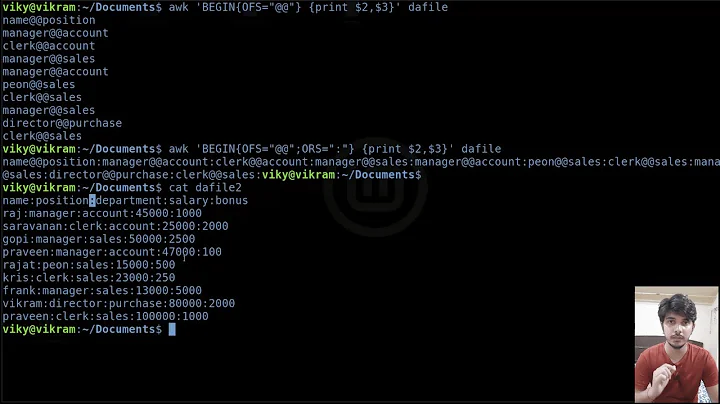Using AWK to select rows with specific value in specific column
Solution 1
The file that you run the script on has DOS line-endings. It may be that it was created on a Windows machine.
Use dos2unix to convert it to a Unix text file.
Alternatively, run it through tr:
tr -d '\r' <input.txt >input-unix.txt
Then use input-unix.txt with your otherwise correct awk code.
To modify the awk code instead of the input file:
awk -F, '$7 == "-99\r"' input.txt >output.txt
This takes the carriage-return at the end of the line into account.
Or,
awk -F, '$7 + 0 == -99' input.txt >output.txt
This forces the 7th column to be interpreted as a number, which "removes" the carriage-return.
Similarly,
awk -F, 'int($7) == -99' input.txt >output.txt
would also remove the \r.
Solution 2
awk -F, '{if($7==-99)print $0}'
will do that...
Solution 3
awk -F',' '$7 ~ /-99/ {print $0}' filename.csv > result.csv
Please note that
','defines your separator to be comma.$defines column. so,$7defines the column number which you want to have a special value. here7.~ /-99/searches for-99. you might put anything you need.$0stands for ALL the columns in the file. You could simply write$1","$2","......if you do not want to print only specific columns.(or$1$2...if you do not need comma as separator for your results)> result.csvsaves the output instead of printing it in terminal inresult.scvfile.
Related videos on Youtube
Isabela Martins
Updated on September 18, 2022Comments
-
Isabela Martins over 1 year
I have a big csv file, which looks like this:
1,2,3,4,5,6,-99 1,2,3,4,5,6,-99 1,2,3,4,5,6,-99 1,2,3,4,5,6,25178 1,2,3,4,5,6,27986 1,2,3,4,5,6,-99I want to select only the lines in which the 7th columns is equal to -99, so my output be:
1,2,3,4,5,6,-99 1,2,3,4,5,6,-99 1,2,3,4,5,6,-99 1,2,3,4,5,6,-99I tried the following:
awk -F, '$7 == -99' input.txt > output.txt awk -F, '{ if ($7 == -99) print $1,$2,$3,$4,$5,$6,$7 }' input.txt > output.txtBut both of them returned an empty output.txt. Can anyone tell me what I'm doing wrong? Thanks.
-
 Sundeep over 6 yearsthe first command works for me, second has a minor typo (closing parenthesis in print stmt) and doesn't set OFS... what is your awk version? probably you have dos style line endings? (but that doesn't cause an issue when I checked)
Sundeep over 6 yearsthe first command works for me, second has a minor typo (closing parenthesis in print stmt) and doesn't set OFS... what is your awk version? probably you have dos style line endings? (but that doesn't cause an issue when I checked) -
Isabela Martins over 6 yearsHow do I know my awk version? Yes, I typed it wrong in here, but it's correct in my script.
-
 Satō Katsura over 6 yearsWith old
Satō Katsura over 6 yearsWith oldawkyou could tryawk -F, '$7 == "-99"'. -
 Sundeep over 6 yearsfor version, try the command
Sundeep over 6 yearsfor version, try the commandawk --versionif that doesn't work, checkman awk -
Isabela Martins over 6 yearsMy version is 1.2
-
Isabela Martins over 6 yearsThese have also returned an empty output.
-
-
 Kusalananda over 6 yearsAs would
Kusalananda over 6 yearsAs wouldawk -F, '$7 == -99' input.txt(from the question), which means that there's something else going on than just getting theawkcode right. -
Isabela Martins over 6 yearsEmpty output...
-
Isabela Martins over 6 yearsI tried the "-99\r" and it worked! That was it. Thank you very much!!
-
Stephen Kitt about 4 yearsNote that Wayne’s approach is simpler still, so this isn’t the simplest solution ;-).
-
MoRe about 3 years+1 Thanks for explaining the command for an
awknoob like me :-)




